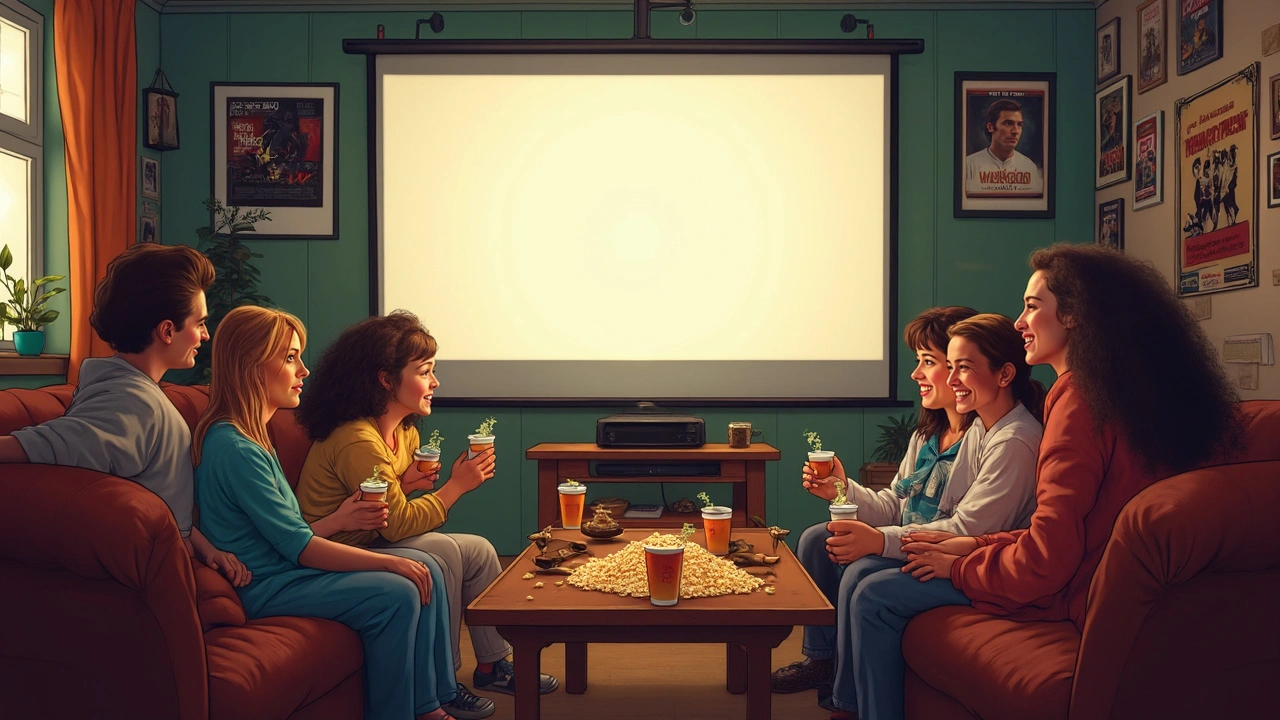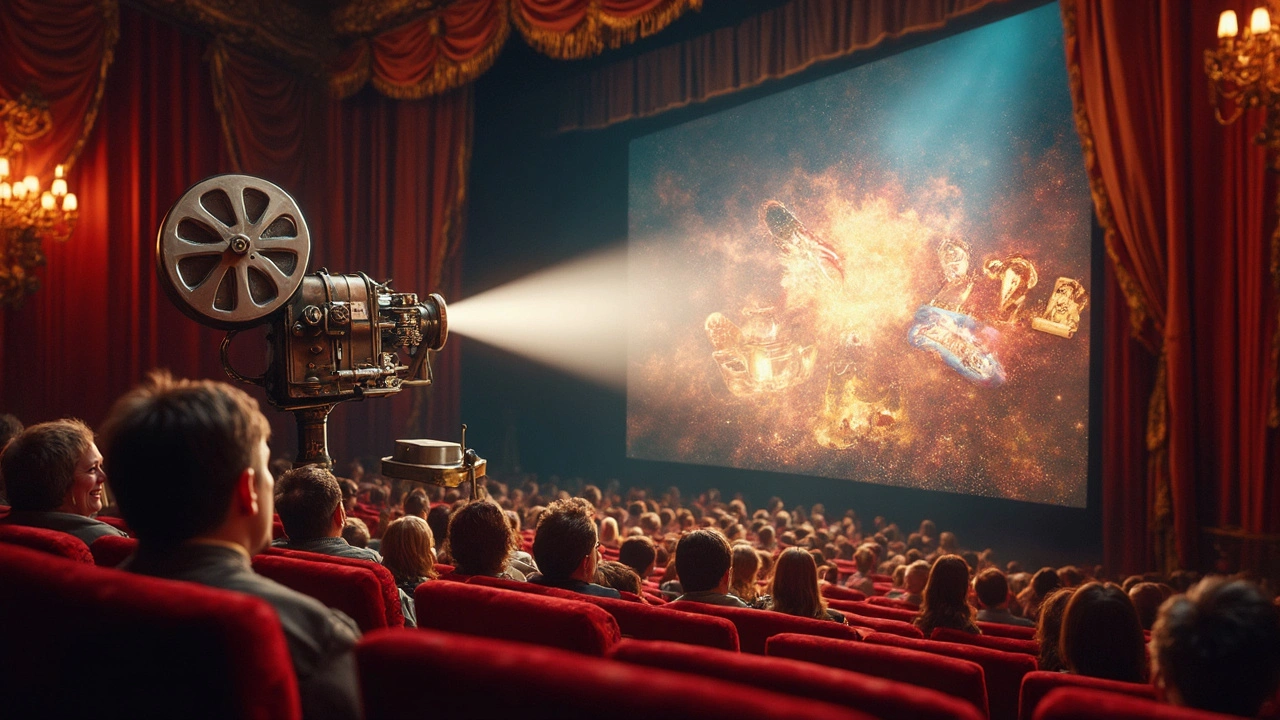When you settle in for a movie night, the sheer variety of films can be overwhelming. Yet, cinema often boils down to four main genres: drama, action, comedy, and science fiction. Each genre offers its own twist on storytelling, capturing our imaginations in different ways.
First up is drama, the bread and butter of the film world. Dramas dive deep into human emotions and relationships, often leaving you with more questions than answers. They’re like life itself—messy, unpredictable, but oh so captivating.
- Defining the Big Four
- Understanding Drama
- The Thrill of Action
- The Magic of Comedy
- Diving into Science Fiction
Defining the Big Four
When we're discussing the world of film genres, it's essential to tackle the Big Four: drama, action, comedy, and science fiction. Each genre stands on its own, shaping the landscape of cinema and offering unique experiences.
Drama: The Heart of Storytelling
Dramas are often where filmmakers go to explore complex characters and situations. They push the human element to the forefront, creating stories that feel real and relatable. If you've ever watched a film that made you think deeply or even cry, it was probably a drama. They win the most awards for their storytelling depth.
Action: Adrenaline-Pumping Excitement
The action genre is all about thrills and spectacle. Explosions, car chases, and high-octane fights are its bread and butter. This genre captivates those who love intensity, delivering fast-paced scenes that keep audiences on the edge of their seats. Think of iconic franchises like James Bond and Fast & Furious; actions speak louder than words here, literally.
Comedy: Laughter is the Best Medicine
Comedy films aim to make us laugh and feel good. Often rooted in satire, slapstick, or clever dialogues, they are like a break from reality. Comedies bring joy, turning mundane situations into hilarious adventures. They've been a staple since the silent film era, proving that a good joke never goes out of style.
Science Fiction: Beyond the Stars
Science fiction, or sci-fi, invites us to think beyond our world, often into the future or the unknown. Whether it's space travel, extraterrestrial life, or futuristic technology, sci-fi expands our imagination. It's grounded in 'what ifs', nurturing our curiosity about what's possible. Classics like Star Trek and Blade Runner have set the bar high for storytelling and visual effects.
Overall, the Big Four genres serve as cornerstones in the world of movies. They entertain, provoke thought, and offer a window into different worlds. So next time you're choosing a film, knowing what each genre entails can enhance your viewing experience.
Understanding Drama
Drama has been a cornerstone of storytelling long before movies came into existence. It's the film genre that thrives on conflict and emotion, drawing audiences into the intimate details of human life. Dramas are often the films that win prestigious awards for their deep narratives and powerful performances.
What makes a drama stand out is its focus on character development and interpersonal relationships. Unlike action-packed flicks or laugh-out-loud comedies, dramas often tackle real-life issues and moral complexities, making them relatable and impactful. Think of titles like 'The Shawshank Redemption' or 'Forrest Gump'—these movies dive deep into the human condition, exploring themes of hope, resilience, and transformation.
As Roger Ebert once said, "Every great film should seem new every time you see it." Dramas, with their layered storytelling, perfect this art.
Key Elements of Drama
- Character Development: Characters in dramas are usually well-rounded and complex, inviting viewers to connect with their journeys on a personal level.
- Conflict: Often internal or interpersonal, conflict is the driving force that moves the plot forward, creating tension that keeps us on the edge of our seats.
- Realism: Dramas are most powerful when they reflect real-world scenarios, creating empathy and understanding among audiences.
Interestingly, the 2022 Academy Awards reported that nearly 70% of nominees in key categories were drama films or had a dramatic core in their storytelling. This speaks volumes about the film genre's ability to resonate with both critics and audiences alike.
For anyone looking to dive deeper into the world of cinema, exploring classic and contemporary dramas is an enriching experience. These films not only entertain but also inspire changes in perspective, making them timeless pieces of art.

The Thrill of Action
There's nothing quite like the adrenaline rush of an action film. Explosions, car chases, and daring heroics can keep us on the edge of our seats. The action genre thrives on high stakes and non-stop movement. It's all about pacing—every moment jam-packed with excitement.
The Birth of Action Films
Action films really took off with the release of movies like 'Die Hard' and 'Lethal Weapon' in the 80s. These flicks set the stage for the adrenaline-fueled rides we know today. Audiences were hooked on films that brought them into the heat of the moment, sometimes making them feel like they were part of the story.
Elements of an Action Film
What makes action films tick? They're typically characterized by fast-moving plots, physical stunts, and intense sequences. Think of all the jump scares, fights, and speed you can handle. These films often feature larger-than-life heroes battling formidable villains. And let's not forget the incredible landscapes—carving paths through bustling cities or isolated wilderness.
Trending Sub-Genres
Action is not just one thing. It breaks into sub-genres like martial arts films, spy thrillers, and even superhero flicks. Each brings its unique flavor.
- Martial Arts: Movies like 'Crouching Tiger, Hidden Dragon' mesmerize us with choreographed combat.
- Spy Thrillers: Titles such as the 'James Bond' series are famous for espionage mixed with action.
- Superhero Movies: Films like 'The Avengers' series combine action with fantasy to create modern spectacles.
In recent years, the action film landscape has embraced more diverse settings and stories, leading to new, exciting themes and characters. So, the next time you're seeking an action flick, consider diving into these sub-genres for a fresh take on thrill and suspense.
The Magic of Comedy
Comedy is often seen as the easy-going sibling of the film world, but don’t let its carefree nature fool you. Creating laughter is a serious business. The best comedies are more than just punchlines—they hold a mirror up to society, often highlighting absurdities and quirks that might go unnoticed otherwise.
When it comes to comedy movies, timing is everything. You've probably noticed how important the pause before a punchline can be—that split-second hesitation that builds anticipation. The great comedians, whether actors or directors, have a knack for making timing look effortless.
The Many Faces of Comedy
Comedy isn’t a one-trick pony. It includes sub-genres like romantic comedy, slapstick, parody, and dark comedy. Each type serves a unique flavor; romantic comedies blend love and humor, while slapstick focuses on physical comedy.
Did you know that classics like Charlie Chaplin's The Great Dictator used comedy to critique political regimes? This shows how powerful the genre can be, delivering social commentary with a side of laughter.
Comedy’s Secret Sauce
What’s the secret to a good comedy film? It’s all about relatability. The best comedies draw on everyday experiences and exaggerate them. Whether it’s a misadventure on a first date or the chaos of a family holiday, these plots resonate because they’re grounded in reality.
Here's a fun fact—if you think comedies are just about making people laugh, think again. They often offer unexpected life lessons, making us reflect while we're wiping tears of joy. Talk about a two-for-one deal!
In the world of cinema, comedies have always been reliable box office hits. Movies like Home Alone or Dumb and Dumber have a cult following with jokes that are quoted years after their release. It proves the enduring appeal of a well-crafted laugh.

Diving into Science Fiction
Science fiction, often shortened to sci-fi, is the genre of limitless possibilities. What makes **science fiction** so compelling is its blend of futuristic tech, mind-bending concepts, and philosophical questions about our world and beyond. If you've watched movies like 'Blade Runner' or 'Interstellar,' you've tapped into classics that define this genre.
Exploring the 'What Ifs'
At its core, sci-fi asks 'What if?' questions—like what if aliens existed, or time travel was possible? These are the playgrounds for the imagination where writers and filmmakers can explore scenarios we're not likely to encounter in real life. This concept is why sci-fi has such a vast range and can overlap with other **film genres**, adding action, drama, or comedy into the mix.
Icons in the Sci-Fi World
Movies like 'Star Wars' not only entertain but have influenced the culture. 'Star Trek' introduced audiences not just to space travel but also to ideas about society and diversity. Each film or series asks us to consider our own place in the universe alongside these exciting adventures.
And hey, did you know that many tech innovations were inspired by sci-fi? Devices like cell phones and tablets were once just futuristic ideas seen in the hands of Captain Kirk and the crew aboard the Enterprise. Fiction often precedes reality!
Sub-genres and Diversity
Sci-fi doesn't just stick to space. It dives into post-apocalyptic worlds, artificial intelligence, and biotechnological mutations too. This means there's something for everyone, whether you enjoy pondering the ethics of AI with movies like 'Ex Machina' or prefer epic space battles.
For a more extensive look, here's a bite-sized breakdown of sci-fi’s appeal:
- Engages curiosity about the universe and our role in it.
- Explores moral and ethical dilemmas in theoretical contexts.
- Influences and predicts technological innovations.
- Offers diverse themes from extra-terrestrial life to time manipulation.

